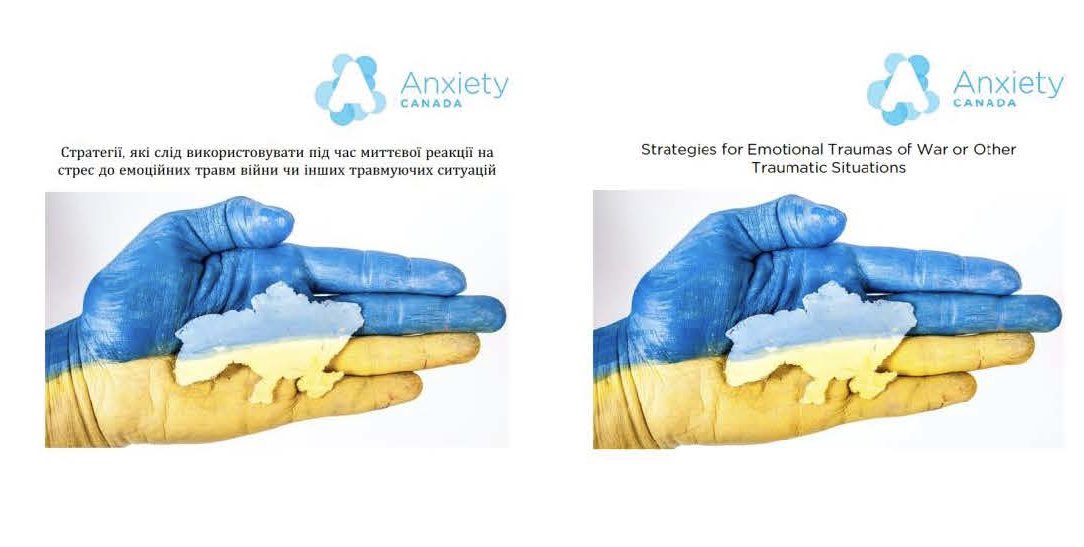With war and other armed conflicts, like the war in Ukraine, ordinary citizens experience highly emotional and traumatic situations, and military personnel try to protect themselves and others, escape their country, or look for safety inside of a war zone.
These highly emotional and traumatic experiences may include forced separation from loved ones, unplanned relocation, witnessing decimation of homes and communities, experiencing life-threatening food insecurity, serious injury, violence, threat of death, and witnessing death of loved ones and others.
We’d like to thank Drs. Daniel Chorney, Maureen Whittal, and Lynn Miller, members of our Scientific Advisory Committee, for preparing this Anxiety Canada resource. We also extend our thanks to Victoria Datsko and Dana Koren Lupynis for their volunteer translation services.
To download this war resource article in PDF format in English or Ukrainian, click below or see our Free Downloadable PDF Resources page.
If you or someone who you care about have experienced or seen dangerous or frightening events that make you fear for your life or life as you know it, there are a range of responses that are normal and expected.
An immediate stress response to frightening, shocking, or life-threatening events of war usually first appears within hours or days of the event. It is common to:
- Continuously think about the event(s), as if a movie is playing over and over in the mind
- Have problems concentrating and focusing attention
- Have difficulty making decisions
- Have problems getting to sleep or staying asleep (or, once in a safe location, sleeping too much)
- Have nightmares
- Experience changes in emotions or feelings, like becoming angry or crying more easily
- Startle easily or become generally more frightened or sensitive to other potential threats
- Feel disconnected from yourself, your body, others, or your surroundings
- Have trouble remembering aspects of the stressful event(s)
If the frightening, shocking, or life-threatening event occurs only once, the immediate stress response will often become less over time. However, in the context of ongoing traumas and future uncertainty, this may not be the case. The stress response might remain for a longer period of time, at least until safety is found and possibly for some time after.
Coping strategies for when you are relatively safe
If you or someone who you care about have recently experienced a frightening, shocking, or life-threatening event related to the war or other traumatic situations and are now in a relatively safe situation, the following strategies may be of help. Not every strategy will be useful to every situation or person.
- Check to see if you are physically injured. Sometimes the focus on immediate danger prevents us from experiencing pain associated with injury. If you notice an injury or experience pain, seek medical attention if it is available.
- Move your body, if it is safe to do so and you are physically able to. Even small movements like arm swings, marching in place, or short walks can help. Movement helps counteract the increase in stress hormones that result in feelings of agitation.
- Establish a routine, to the extent that it is possible. A routine can provide a sense of familiarity. Even if the situation is unfamiliar and the future is uncertain, a routine is one way of having a little bit of control. Doing tasks at the same time every day or in the same order is one way to establish a routine.
- Take a few moments throughout the day take deep breaths. Pay attention to the movement of air in and out of your body. Deep breathing can help lower the feeling of stress in your body.
- Talk about the traumatic events with supportive others who have either been in a similar situation or who have an understanding of it and will accept your reaction to it.
- As you talk about your experiences, it will be natural to discuss your worries, anxiety, and fears. Also focus on your ability to cope in an extremely difficult situation. When talking with others or thinking about your experiences by yourself, focus on your resilience and strength and how these have helped you get where you are.
- You may have thoughts about your scary experiences. Sometimes these thoughts will happen at difficult times because you saw, heard, smelled, or tasted things that remind you of the scary experiences. Although it can be very difficult, let yourself have these thoughts a little bit at a time without trying to push them away. Remind yourself of your strength when having these thoughts.
- Avoiding situations that remind you of your experiences is a common reaction. In the long term, avoidance is not helpful. You might have difficulty knowing if a situation is safe. There will be times that will not be safe (e.g., hearing bombs going off). Other times it will feel unsafe but there will not be immediate danger.
- If you are unsure of your actual risk, look to those around you who are not experiencing immediate stress responses (possibly aid workers or other support people who do not have a history of trauma) to help you judge the threat, and do what they do.
- Wanting to forget your experiences may seem like a good idea, but it could prolong your stress reaction and become a problem of its own. Be careful about using drugs and alcohol or other strategies that serve to numb you out.
- Don’t isolate yourself from others. It is helpful to be around other people to provide a sense of community and remind you that you are not alone.
- Sometimes we can be harsh with ourselves and our inability to ‘get over it’ and move on. This self-criticism can make a difficult situation worse. Be patient and compassionate with yourself as you move through this exceptionally hard time. Treat yourself like you would treat a loved one.

Coping strategies for adults experiencing traumatic events
If you are caring for an adult who is experiencing stress from a frightening, shocking, or life-threatening event related to the war or other traumatic situations, the following strategies may be helpful. These strategies are presented in chronological order in which they should be considered.
- Present a calm demeanor (even if you don’t feel it).
- Attend to basic needs (if possible), including securing access to food and water, sheltering from further traumatization, assessing physical health, and the need for medical attention.
- Try to re-establish social supports that can include reconnecting with family or friends, even people who live in other countries.
- Foster hope to the extent that you can, but be realistic. For example, say things like ‘We don’t know how this situation will end but you have the support of millions of people all over the world’
- Normalize a person’s reactions. Sadness, fear, anger, grief, guilt, and worry about the present and future are all normal reactions.
- Encourage the use of adaptive coping strategies such as establishing routines (even if they are in a new situation, such as a refugee camp), deep breathing, and exercise.
- Discourage strategies that result in numbing (e.g., drugs or alcohol, blocking or pushing away thoughts of the traumatic situation).
- Let people talk about their experiences if they want, and do encourage discussion with gentle nudges, BUT don’t force it.
These strategies may help reduce the severity of stress responses to frightening, shocking, or life-threatening event related to the war or other traumatic situations. In many cases, the immediate stress response will subside over time and once in relative safety. If the stress response persists for more than a month and significantly impacts ability to perform tasks of daily living, it may be necessary to seek additional professional advice and support when it is available.

To download this article in PDF format in English or Ukrainian, click below or see our Free Downloadable PDF Resources page.
This Anxiety Canada resource was prepared by Drs. Maureen Whittal, Christiana Bratiotis, and Gordon Asmundson, who are all members of the Scientific Advisory Committee. Volunteer translation services were provided by Victoria Datsko and Dana Koren Lupynis.
